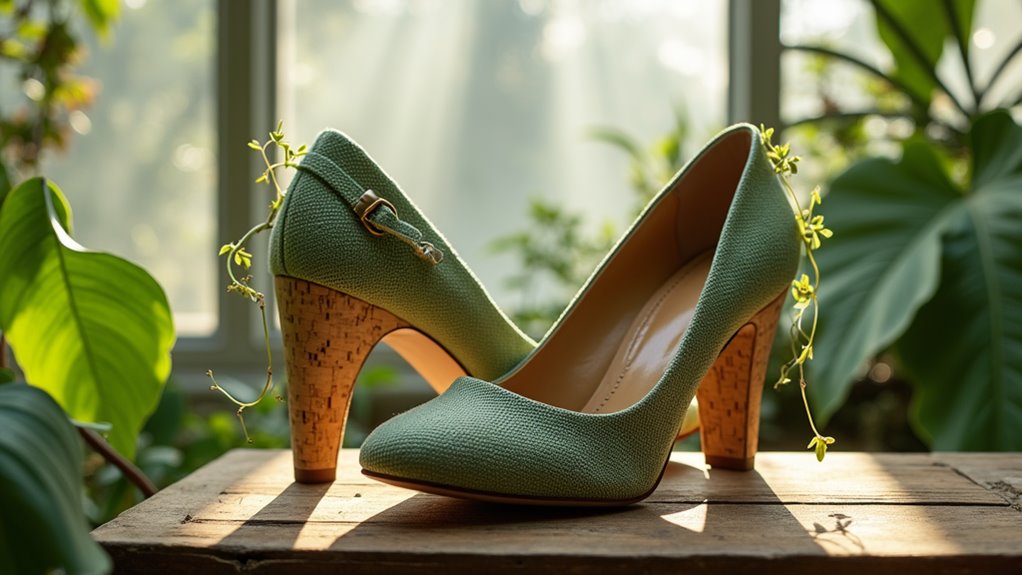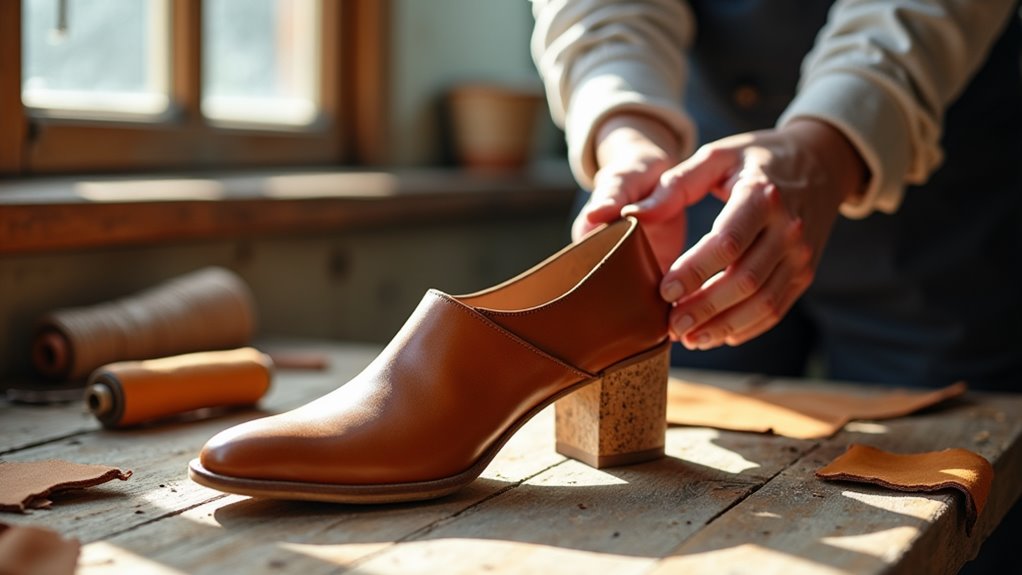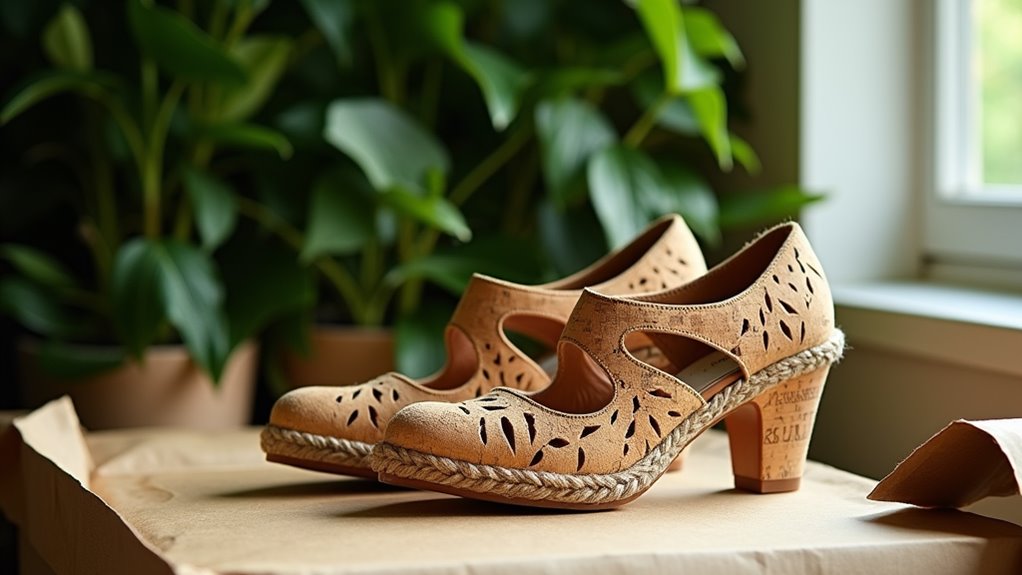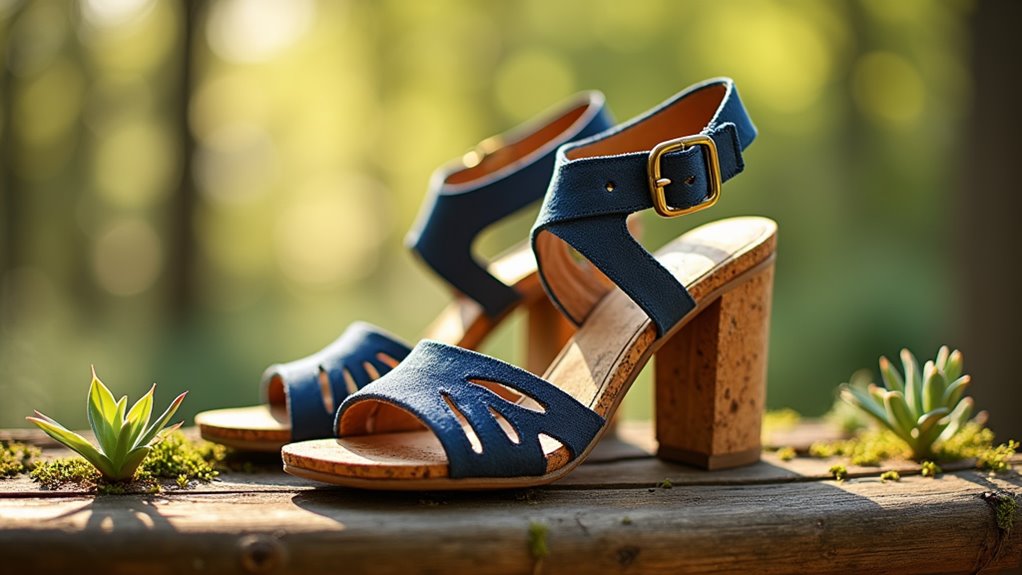There may be products. Products are independently selected by our editors. We may earn an affiliate commission from the links with no charge to you, example: as Amazon Affiliate.
We’re witnessing a remarkable shift in luxury footwear that most fashion enthusiasts haven’t noticed: traditional heel manufacturing actually wastes up to 30% of raw materials through conventional cutting techniques. Today’s sustainable shoe designers aren’t just creating eco-friendly alternatives; they’re revolutionizing production methods through zero-waste pattern cutting and biodegradable components. While we’ve long associated high-end heels with exotic leathers and synthetic materials, the latest innovations in plant-based alternatives and circular design principles are challenging everything we thought we knew about luxury footwear, setting the stage for a fascinating exploration of fashion’s sustainable future.
Key Takeaways
- Natural materials like cork and biodegradable vegetable-tanned leather offer sustainable alternatives for heel construction while maintaining luxury standards.
- Artisanal craftsmanship and local production methods reduce transportation emissions and support ethical labor practices in heel manufacturing.
- Recycled plastic and vegan leather options provide eco-friendly alternatives for heel designs without compromising style or durability.
- On-demand production models help minimize waste and ensure better transparency in sustainable heel manufacturing processes.
- Brands utilizing Life Cycle Assessments can reduce their carbon footprint by up to 50% through eco-friendly heel production methods.
The Rise of Sustainable Footwear

As consumers become increasingly aware of fashion’s environmental impact, sustainable footwear has emerged as a powerful force in the industry.
We’re witnessing a remarkable shift as brands embrace eco-friendly options and fair labor practices, revolutionizing how we think about our favorite shoes.
Leading manufacturers are now incorporating innovative sustainable materials, from recycled plastic to biodegradable alternatives, without compromising style or comfort.
What’s particularly exciting is how brands like Alohas and Reformation are transforming the industry through on-demand production models, ensuring transparency and traceability throughout their supply chains.
With the rise of vegan options and certifications like B Corporation status, we’re seeing a new era where conscious consumption meets cutting-edge design.
This movement isn’t just about following trends – it’s about reshaping the future of fashion responsibly.
Innovative companies are now creating stylish footwear using ocean waste materials, helping to address marine pollution while delivering fashionable options for conscious consumers.
Materials Revolutionizing Fashion
While traditional footwear materials have dominated the industry for decades, innovative eco-friendly alternatives are now transforming how we craft and wear heels. We’re seeing sustainable materials that not only reduce environmental impact but also enhance comfort and style. Let’s explore these revolutionary options:
| Material | Benefits |
|---|---|
| Cork | Natural cushioning, renewable harvesting |
| Natural Rubber | Superior shock absorption, tree-derived |
| Recycled Plastic | Reduces ocean waste, durable construction |
| Vegan Leather | Ethical alternative, eco-conscious choice |
These sustainable materials are reshaping our approach to fashion, proving that we don’t need to sacrifice style for sustainability. From cork’s excellent insulation properties to recycled plastic’s versatile applications, these innovations are setting new standards for eco-friendly footwear while maintaining the sophistication we love in our heels. The growing demand for sustainable shoe options has inspired numerous fashion brands to create dedicated eco-friendly collections.
Ethical Production and Artisanal Craftsmanship

Behind every sustainable heel lies a story of skilled artisans and ethical production methods that honor both tradition and innovation.
We’re seeing this commitment to sustainable fashion through brands like Brother Vellies, which partners with African artisans using local kudu leather, and By FAR’s ingenious use of deadstock materials in Bulgarian family workshops.
What’s exciting is how these brands are reimagining classic styles through fair trade practices.
Chie Mihara’s Spanish craftsmanship proves that eco-friendly materials and comfort can coexist beautifully, while Fortress of Inca celebrates Peruvian heritage through local artisanal craftsmanship.
We’re particularly inspired by Paloma Wool’s collaborative approach, bringing together artists and artisans to create designs that honor both community and sustainability.
These brands show us that ethical production isn’t just about making shoes—it’s about preserving traditions and supporting local economies.
Modern consumers can now choose from a wide selection of non-leather heels that align with sustainable fashion values.
Mindful Design Meets Luxury
Luxury fashion is undergoing a radical transformation, where mindful design and eco-consciousness now define true sophistication.
We’re witnessing sustainable shoe brands like Gabriela Hearst and AERA revolutionize the industry through innovative materials and ethical practices that don’t compromise on style.
Today’s mindful design embraces eco-friendly materials such as biodegradable vegetable-tanned leather and recycled PET, proving that sustainability and luxury can coexist beautifully.
We’re particularly excited about the integration of natural rubber and cork in heel production, which significantly reduces waste and energy consumption while maintaining premium quality.
Leading brands are showing us that vegan leather alternatives and upcycled materials can create stunning footwear that meets the highest standards of luxury fashion, all while prioritizing our planet’s wellbeing through transparent supply chains and conscious manufacturing.
Modern consumers can now easily discover eco-friendly heel options through dedicated sustainable fashion marketplaces and webshops.
Environmental Impact of Shoe Manufacturing

As we examine the true cost of footwear production, traditional shoe manufacturing emerges as a significant contributor to environmental degradation.
From toxic tanning processes in conventional leather production to synthetic materials that overwhelm our landfills, we’re facing critical environmental challenges in the footwear industry.
We’re seeing innovative solutions through eco-friendly materials and sustainable leather alternatives that are revolutionizing the design process.
Forward-thinking brands are ensuring ethical production by implementing fair use practices and conducting thorough Life Cycle Assessments.
By incorporating biodegradable components and vegan alternatives, we’re reducing our carbon footprint by up to 50%.
The shift toward natural rubber and recycled materials isn’t just a trend – it’s a necessary evolution in how we approach shoe manufacturing, promising a more sustainable future for fashion.
Modern consumers can now choose from an extensive selection of sustainable heel materials that minimize environmental impact while maintaining style.
Conclusion
We’re witnessing a footwear revolution that’s powerful enough to move mountains. As we embrace sustainable heels crafted from earth-friendly materials, we’re not just making a fashion statement – we’re voting for our planet’s future. By choosing mindfully designed luxury that respects both artisans and ecosystems, we’re stepping into a world where style and sustainability walk hand in hand, leaving the lightest possible footprint behind.

